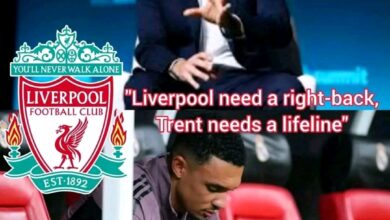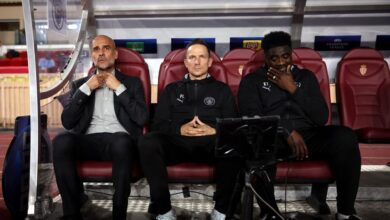Liverpool player ratings as Mohamed Salah keeps his cool but only one other excellent vs Burnley

Liverpool’s journey to Turf Moor was not just another Premier League game. It was the kind of afternoon where champions are tested in ways that statistics and possession charts can never explain. A battle against Burnley is always about more than football. It is about sweat, about fighting through resistance, about escaping the clutches of a team that knows how to make life miserable for bigger sides. And on this September afternoon, Arne Slot and his men found themselves in exactly that kind of fight. The Reds left with three points, but only after Mohamed Salah, the Egyptian King, stood tall in the final minutes and turned despair into celebration. A late penalty that silenced Turf Moor and sent the traveling Liverpool supporters into wild eruption was the difference. But behind that single moment lay ninety-five minutes of frustration, tension, wasted chances, defensive struggles, tactical gambles, and individual stories of glory and failure that defined the match.
From the opening whistle, Liverpool carried themselves like champions defending a crown. They had the ball, they had the intent, they had the rhythm, yet something was missing. Turf Moor was tight, hostile, the crowd roaring with every Burnley clearance. Slot’s men kept pushing, wave after wave, but it was as if they were running into a stone wall. The fans who made the short journey from Merseyside kept singing, but even they began to feel the nerves as chance after chance slipped away.
Alisson Becker, standing at the far end of the pitch, had one of those afternoons where the goalkeeper feels like a lonely spectator. Burnley rarely tested him, a shot flying over in the early minutes that he calmly watched drift into the stands. But his focus never wavered, because he knows games like this are dangerous. For long stretches, he was simply a guardian watching Liverpool’s wastefulness from a distance. His rating would not soar, not because of errors, but because he had little to do except stay sharp for a threat that never truly came. He will be marked as a six, not poor, not brilliant, but steady. Sometimes steady is enough.
The story of Dominik Szoboszlai was one of two halves. In the first, he looked misplaced, struggling as a right-back forced into duties he could not fully embrace. He pressed Burnley, he snapped at their heels, he even won back possession, but his creativity was stifled. The Hungarian playmaker is built for attacking freedom, not defensive positioning. Yet Slot’s tactical gamble placed him there, and it nearly cost Liverpool dearly. The second half, however, saw the switch. Freed into midfield, Szoboszlai rediscovered himself. Suddenly he was threading passes, driving forward, and injecting urgency into a stagnant attack. His rating rises to seven, because he symbolized Liverpool’s shift from frustration to threat.
At the back, the defenders looked uncomfortable. Burnley, even with ten men, made life chaotic. Crosses flew into the Liverpool box, long balls tested their positioning, and moments of hesitation kept the supporters on edge. Without Konate, and with Matip long gone, there is a feeling that Liverpool’s defense is built on fragile balance. Virgil van Dijk carried the armband and the responsibility, but even he had spells of discomfort. Turf Moor has always been a place where towering centre-backs must prove their worth, and while van Dijk handled the aerial duels, there were glimpses of doubt that remind fans this defense is not invincible. His rating settles around seven, for presence and composure when needed, but nothing spectacular.
Alongside him, Jarell Quansah continues to show promise but also inexperience. The youngster dealt with the physical battles, yet his positioning was sometimes naive. Burnley’s forwards sniffed out gaps, and on another day, Liverpool could have been punished. He is still growing, still learning, and Turf Moor was another lesson. His rating hovers at six, with more to come in the future.
Full-backs were another tale. Jeremie Frimpong, dynamic and full of pace, was Liverpool’s weapon down the flank. His runs stretched Burnley, his crosses asked questions, and it was one of his deliveries that forced the decisive handball from Hannibal Mejbri in stoppage time. Frimpong never stopped running, never stopped trying, and while not every cross found its man, he created the chaos that ultimately won the game. His rating deserves an eight, because sometimes persistence is as valuable as brilliance.
On the opposite side, Andrew Robertson fought his usual battle. Determined, passionate, sprinting up and down, delivering crosses that Burnley often cleared, but still driving Liverpool forward. Robertson is a heartbeat player, someone who brings energy when the game slows. His rating would stand at seven, because while not extraordinary, his contribution was tireless and essential.
In midfield, Alexis Mac Allister played as the anchor. Calm on the ball, recycling possession, keeping Liverpool ticking. Turf Moor is not the easiest ground for technical midfielders, but Mac Allister remained composed. His rating lands at seven, steady and reliable. Next to him, Curtis Jones offered running, pressing, and bursts of energy, but lacked the killer pass. His industry deserves recognition, rating at six and a half.
Up front, the struggles were glaring. Hugo Ekitike was given the responsibility of leading the line, but he vanished for long spells. The young striker was swallowed by Burnley’s defenders, unable to hold up play or threaten the goal. Liverpool fans expected more, and Slot’s decision to start him instead of unleashing Alexander Isak immediately looked questionable. Ekitike’s rating drops to five, because he offered too little.
Mohamed Salah, however, was once again the savior. The Egyptian tried throughout, cutting inside, creating space, linking play, but for most of the afternoon, even he seemed frustrated. Chances were half-formed, shots were blocked, the clock ticked towards despair. Yet champions write their stories in moments, and Salah’s moment came in the 95th minute. When Hannibal Mejbri raised his arm and blocked Frimpong’s cross, the referee pointed to the spot. Salah stood over the ball, calm as ever, the pressure of an entire fanbase on his shoulders. Turf Moor roared, trying to break his concentration, but Salah was ice. He stepped up, struck clean, and sent the goalkeeper the wrong way. The net bulged, the away end exploded, and Liverpool’s unbeaten start was preserved. That goal alone elevates his rating to nine, because he delivered when it mattered most.
As the players celebrated, Slot’s face told the story. Relief, more than joy. He knew his decisions had been risky, almost reckless. Leaving Isak out, relying on Ekitike, shifting Szoboszlai into right-back—these were calls that nearly backfired. Only Salah’s calm and Burnley’s madness saved the Dutchman from headlines filled with criticism. Football is a game of fine margins, and Slot escaped on the right side of them.
The narrative of this match is one Liverpool fans will remember not because of beauty, but because of survival. Turf Moor was a battlefield, not a showcase. Burnley, even with ten men, made it a nightmare. Ugochukwu’s red card gave Liverpool the advantage, but it still looked like two points lost until the final twist. That twist came, and champions often need such fortune.
Looking deeper, this game exposed truths. Liverpool still lack a settled striker until Isak makes his debut. The defense, without Konate, looks fragile. The midfield balance is improving but remains a work in progress. And Salah, at thirty-three, still carries the burden of being the man to deliver in the toughest moments. For all the money spent, for all the new faces, it was still the Egyptian King who saved the day.
Fans will debate Slot’s choices. Was it wise to rest Isak? Was it necessary to experiment with Szoboszlai? These are questions that will follow the Dutchman. What is certain is that results matter more than performances in the race for the title, and Liverpool remain top, three points clear, with a perfect record. The narrative of champions is not written only in dominant victories, but in ugly, scrappy wins like this one.
As the Liverpool supporters left Turf Moor, voices hoarse from ninety-five minutes of anxiety and then joy, they knew they had witnessed a test. They knew their team had been pushed, had almost faltered, but had found a way. Football at its heart is about these days, where one penalty can change the mood of an entire club. Salah’s goal was more than just three points. It was a reminder of resilience, of character, of the thin line between failure and triumph.
And so, the ratings reflect the story. Alisson a quiet six. Szoboszlai a tale of two roles, rising to seven. Van Dijk steady at seven, Quansah learning at six. Robertson reliable at seven, Frimpong dangerous at eight. Mac Allister controlled at seven, Jones energetic at six and a half. Ekitike anonymous at five. Salah the savior at nine.
But beyond the numbers lies the truth of Liverpool’s title defense. It will not always be easy. It will not always be pretty. But if they can grind out wins in places like Turf Moor, if they can lean on leaders like Salah, and if Slot can learn from the risks he takes, then the story of this season could yet end in glory. Turf Moor may have almost broken them, but instead, it reminded them who they are.
This was not just a win. This was survival, resilience, and the mark of champions.















